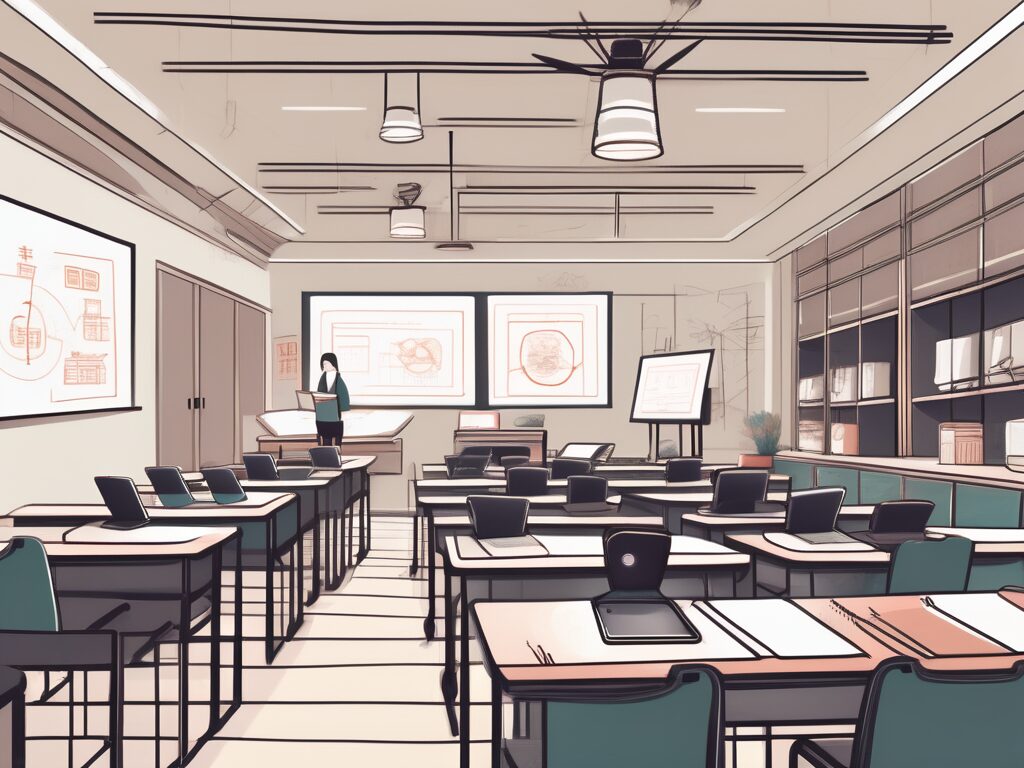In the realm of education, technology has become a game-changer, revolutionising the way teaching and learning processes are conducted. This is particularly evident in China, where educators with a Master’s in Education are employing innovative methods to integrate technology into their classrooms. In this blog, we will delve into four such methods, exploring how they are enhancing the educational landscape in China.
1. Interactive Whiteboards
What are Interactive Whiteboards?
Interactive whiteboards (IWBs) are large interactive displays that connect to a computer and projector. They are a step up from traditional blackboards, offering a plethora of features that make learning more engaging and interactive.
Imagine a giant tablet mounted on the wall, where teachers and students can write, draw, move images around, and even play videos. That’s an interactive whiteboard for you. It’s like bringing a smartphone or tablet’s functionality into a classroom setting, but on a much larger scale.
How are they used in China?
In China, educators with a Master’s in Education are using IWBs to create a dynamic learning environment. They are utilising these boards to present complex concepts in a visually appealing and easy-to-understand manner. For instance, a geography teacher might use an IWB to display and manipulate a 3D map, making it easier for students to understand topography.
Moreover, IWBs in China classrooms are often connected to the internet, providing teachers with access to a vast array of online resources. This allows them to incorporate multimedia content into their lessons, further enhancing the learning experience.
2. Learning Management Systems
What are Learning Management Systems?
Learning Management Systems (LMS) are software applications used for the administration, documentation, tracking, and delivery of educational courses. They provide a centralised platform where educators can manage course content, assess student performance, and communicate with students.
Think of it as a digital classroom, where teachers can post assignments, students can submit their work, and grades can be tracked and reported. It’s like a virtual school bag, but with much more functionality.
How are they used in China?
Chinese educators are leveraging LMS to streamline their teaching processes and enhance student learning. They are using these systems to provide personalised learning experiences, track student progress, and facilitate communication.
For instance, a teacher might use an LMS to assign homework to students, who can then complete and submit it online. The teacher can then grade the assignments on the platform and provide feedback, all without the need for physical paperwork. This not only makes the process more efficient but also allows for real-time feedback and communication.
3. Augmented Reality
What is Augmented Reality?
Augmented Reality (AR) is a technology that overlays digital information on the real world, enhancing what we see, hear, and feel. It’s like adding a layer of digital magic to our physical environment, making it more interactive and immersive.
Imagine looking at a textbook and seeing the images come to life, or pointing your phone at a historical monument and getting information about it on your screen. That’s AR for you. It’s like bringing the digital world into our physical world, creating a blend of the two.
How is it used in China?
In China, AR is being used to bring lessons to life. Educators are using AR apps to create immersive learning experiences, making subjects more engaging and easier to understand. For instance, a biology teacher might use an AR app to display a 3D model of a human heart, allowing students to explore it from different angles.
Moreover, AR is being used to create interactive textbooks in China. These textbooks, when viewed through an AR app, display animations and additional information, making the learning process more engaging and fun.
4. Online Collaboration Tools
What are Online Collaboration Tools?
Online collaboration tools are software applications that allow people to work together on projects, regardless of their physical location. They provide a platform where users can share files, communicate, and collaborate in real-time.
Imagine working on a group project with your classmates, but instead of meeting in person, you’re all working from your own homes, communicating via video call, and sharing files on a shared platform. That’s online collaboration for you. It’s like bringing the classroom into your home, making distance learning possible.
How are they used in China?
With the rise of remote learning in China, online collaboration tools have become indispensable. Educators are using these tools to facilitate group projects, conduct online classes, and maintain communication with students.
For instance, a teacher might use a collaboration tool to assign a group project. The students can then work together on the platform, sharing files, discussing ideas, and even presenting their work to the teacher, all without having to meet in person.
In conclusion, technology is reshaping education in China, with educators utilising various methods to enhance teaching and learning. From interactive whiteboards and learning management systems to augmented reality and online collaboration tools, technology is making education more engaging, interactive, and efficient. And with a Master’s in Education, educators are well-equipped to navigate this digital revolution, leading the way towards a brighter educational future.
Advance Your Educational Career with iQTS
As technology transforms classrooms in China and beyond, educators must stay ahead of the curve. The IQTS at UWE offers the International Qualified Teacher Status (iQTS) Programme, specifically designed to elevate your teaching credentials to a global standard. Embrace the opportunity to enhance your professional development, increase your chances for career advancement, and connect with an extensive network of education professionals. With the iQTS, you’re not just adapting to the digital revolution in education; you’re leading it. Make Your Next Step towards achieving international recognition and unlocking your full potential as an educator.

